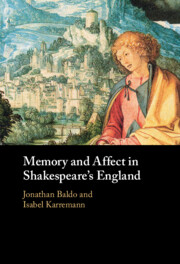Book contents
- Memory and Affect in Shakespeare’s England
- Memory and Affect in Shakespeare’s England
- Copyright page
- Contents
- Figures
- Contributors
- Acknowledgments
- Introduction
- Part I Ars memoriae, ars amatoria
- Part II The Politics of Memory and Affect
- Part III Affective Memory
- Chapter 7 “My despised time”
- Chapter 8 Remembering Water in Robert Yarington’s Two Lamentable Tragedies
- Chapter 9 Mourning Memory in Cymbeline
- Part IV Memory, Affect, and Stagecraft
- Coda
- Bibliography
- Index
Chapter 7 - “My despised time”
Memory, Temporality, and Disgust in Shakespearean Tragedy
from Part III - Affective Memory
Published online by Cambridge University Press: 07 June 2023
- Memory and Affect in Shakespeare’s England
- Memory and Affect in Shakespeare’s England
- Copyright page
- Contents
- Figures
- Contributors
- Acknowledgments
- Introduction
- Part I Ars memoriae, ars amatoria
- Part II The Politics of Memory and Affect
- Part III Affective Memory
- Chapter 7 “My despised time”
- Chapter 8 Remembering Water in Robert Yarington’s Two Lamentable Tragedies
- Chapter 9 Mourning Memory in Cymbeline
- Part IV Memory, Affect, and Stagecraft
- Coda
- Bibliography
- Index
Summary
While it is only recently that disgust has been (re)assessed as a category of analysis for the Early Modern period, its temporalities are in need of further investigation. The chapter argues that disgust is triggered and represented by material memory objects in Hamlet and Othello. Here, disgust serves as affective response to the pressure of seemingly paradoxical temporalities – Hamlet’s experience of a past that is embodied in the untimely object of the skull, and Othello’s experience of a ‘future anterior’ that is mediated by and manifested in the handkerchief, respectively. In the two plays, the temporality of disgust is paradoxical: it simultaneously lags behind the memory object from which it recoils and generates the object in the very act of recoiling. By reading the respective temporalities of disgust both tragedies display, I suggest that the affective dynamics of disgust find literary analogy in the structural dynamics of both Hamlet’s and Othello’s fundamental dramatic conflict.
- Type
- Chapter
- Information
- Memory and Affect in Shakespeare's England , pp. 143 - 161Publisher: Cambridge University PressPrint publication year: 2023

